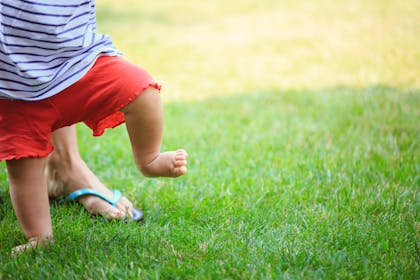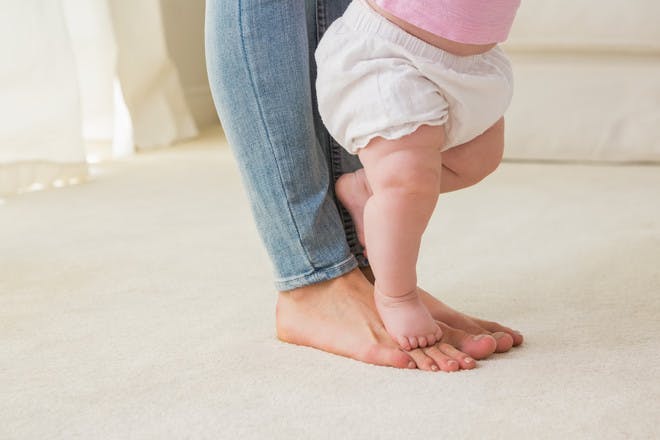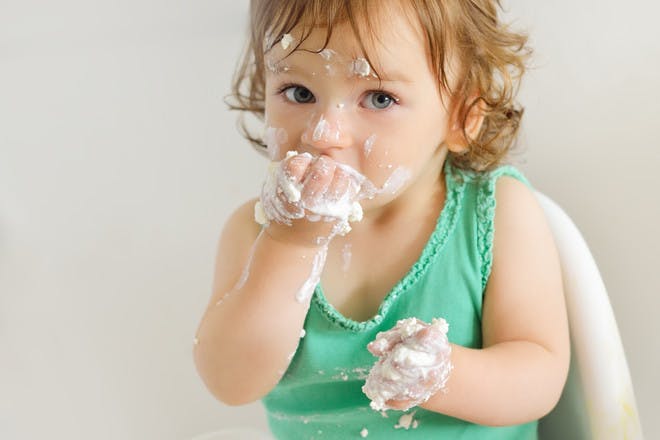Film By You: capturing those magical milestones

Watching your child grow up is – as every parent knows – a bittersweet experience. With every new development comes that overwhelming feeling of pride and amazement, along with a dash of sadness that they’re growing and changing so quickly.
This page contains affiliate links, which means we may earn a small amount of money if a reader clicks through and makes a purchase. All our articles and reviews are written independently by the Netmums editorial team.
Important moments in your child's life
Every child develops at their own pace, but whether yours is ahead of the pack or prefers to do things in their own sweet time, it’s always exciting to see them reach a new milestone. And while each new change is magical, we reckon these have to be some of the best.
6-9 months: pulling up
Until now, your baby has seen everything from floor level. But at around six to nine months, they’ll start to pull themselves up to standing, using everything from your coffee table to your trouser leg for support – and gain a whole new perspective on the world.
You can help your child by encouraging them to hold onto low pieces of furniture like the sofa, for example, by putting some tempting toys on the seat to attract their attention.
FREE NEWBORN NAPPIES
You can also help them gain strength and stability by singing action songs like Row, Row, Row the Boat with them standing upright on your lap, and by letting them practise taking steps while holding on to your fingers.
9-15 months: standing alone
Once your baby has found their feet, they’ll grow in confidence and start letting go of the prop they used to pull up with, standing hands-free.
They’ll be thoroughly delighted with this new development: expect lots of huge smiles and clapping as they show off their skills. Join in with lots of lavish praise to let them know how well they’re doing.
Need advice?
Our health visitors and nursery nurses are on line Monday to Friday evenings to answer your queries on feeding, sleep and child health.


At this stage, a push-along walker like the Fisher-Price Learn With Me Zebra Walker (£29.99) will help give your child the courage to stand independently and start to take steps with support. Its easy-grasp handle and sturdy four-wheel base will steady their wobbly paces, with fun phrases, music and songs to provide encouragement.
10-18 months: walking independently
Probably the biggest development in your child’s first few years is them mastering the art of walking – and making the transition from baby to toddler.
There’s a huge range as to when they'll do this, with some babies taking their first steps at 10 months and others not getting going until two, but it’s always a time of lots of excitement – and plenty of bumps! If you haven’t child-proofed your house with stair gates and child locks, now’s the time to do it.
The more practice your toddler gets at walking, the better they’ll get, so give them lots of opportunities to walk with you, using reins for safety if you’re near a road or open water.
It’s also sensible to teach them how to go up and down stairs safely, but never let them tackle steps on their own.
12-18 months: first words
There’s nothing quite as heart-warming as hearing your baby call you ‘mama’ for the first time, and it usually happens sometime around their first birthday. They’ll also start to respond to their own name at this point.
The best thing you can do to encourage your child is to talk to them – a lot! Whether you’re chatting to them as you’re changing their nappy, talking to them about the ducks in the park, singing nursery rhymes or reading a bedtime story, the more they’re exposed to language, the faster they’ll develop.
Don’t worry if their words aren’t very clear at first – simply reinforce the correct pronunciation by repeating the word back to them (‘Yes, you’re right, it’s a CAT!’).
Interactive toys can also help satisfy your child’s thirst for language. Dance & Move BeatBo from Fisher-Price (£39.99) is a fun, entertaining companion that introduces letters, numbers and colours through games and music. You can even record your own phrases that BeatBo will then remix into a song for your baby to groove along with.
18 months-2 years: feeding themselves

This is the age of independence, and many parents suddenly notice their children want to do EVERYTHING by themselves – including eating.
This can be a liberating stage, as you’re no longer tied to spoon-feeding them, but it can also be messy! Little hands take some time to master cutlery, and they’re just as likely to dive in with their hands.
You can make it easier by providing tableware and cutlery that’s especially designed for toddlers. Make sure they have some finger food at every meal so they develop the hand-eye coordination need to get food from plate to mouth.
Snacks like breadsticks, raisins and mini rice cakes are great for encouraging children to self-feed, but never leave them unattended in case of choking.
2-3 years: potty training
It’s the stage most parents dread, but once it’s over, life becomes much easier! Although most children potty train between two and three years, some aren’t reliably dry until four, so don’t panic if it’s a slow process.
When you’re ready to start potty training, make it easy by having a potty in every room, and dressing your child in clothes that they can pull down by themselves. Give them lots of praise for every success, and don’t overreact to accidents: they’re inevitable, so just calmly clean up and remind them to try to use the potty next time.
There are some great storybooks about potty training that can encourage your child to give it a try, and a reward chart, with a sticker or a star for every time they perform on the potty, can be a great motivator too.

